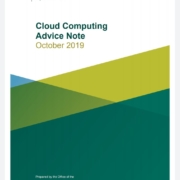Central Government Accounting Standards – What You Need to Know

From January 1st, new Central Government Accounting Standards (CGAS) will see significant reform of financial reporting for all Government Departments and Offices of Government. These new standards, being based on the International Public Sector Accounting Standards (IPSAS) generally favoured by the European Commission, aim to modernise financial reporting in Ireland along lines proposed by successive IMF and OECD reports.
The CGAS will change how public sector Vote accounts are to be prepared, requiring that financial statements also include information prepared on an accruals basis in the Statement of Financial Position. This article will run through the key changes imposed by the CGAS and explain the principles behind these.
Requirements
The CGAS coming into effect from January 1st are envisioned as a stage in a wider process of reform of financial reporting in Ireland. For the moment, the CGAS and their requirements apply to the following bodies:
- All Departments and Offices of Government
- The Houses of the Oireachtas Commission
- The National Training Fund
- The Social Insurance Fund
For these bodies, the CGAS imposes requirements as to how their Statements of Financial Position are presented. Specifically, they are now required to account for all of the following in their Statements:
- Property, Plant and Equipment
- Intangible Assets
- Impairment of Non-Cash Generating Assets
- Impairment of Cash Generating Assets
- Service Concession Arrangements
- Inventory
- Leases
- Provisions, Contingent Liabilities, Contingent Assets
- Short-Term Employee Benefits
For each of these areas, a relevant CGAS detailing the exact requirements has been prepared by the Department of Public Expenditure, NDP Delivery and Reform. In addition, each of the CGAS has been provided with a manual, or Central Government Accounting Manual (CGAM). These manuals provide guidance on how the CGAS should be implemented and are a support for Finance Officers working to bring their organisation into line with the CGAS.
Government documents relating to the CGAS have emphasised that all relevant bodies must ensure that the principle of materiality is observed in their financial reporting. As an accounting principle, materiality requires that financial statements include all information and items that relevant decision makers, such as investors, might consider to impact their activity. In other words, an organisation’s economic activity can be considered to be material if it might be of interest to any and all bodies which would view that organisation’s financial statements.
In principle, then, the CGAS are to replace a cash-based system of financial reporting with reporting carried out on an accruals basis. Under the CGAS, an organisation must record economic activity regardless of whether cash was exchanged or involved in that activity. For example, under the CGAS, contingent liabilities such as guarantees, where no cash exchange has yet occurred, have to be reported.
Transitions and Enforcement
As noted, the CGAS are being adopted as part of a modernisation of Irish financial reporting, with the aim of bringing Ireland into line with the majority of OECD and EU countries. Ultimately, this reform project will formalise accrual accounting financial reporting in Ireland. Given that this reform is to secure the international credibility of financial reporting in Ireland, Central Government guidance has emphasised the importance of compliance with the CGAS.
Where a relevant body is unable to comply fully with any of the CGAS, sanction for a temporary derogation should be secured from the Government Accounting Unit in the Department of Public Expenditure, NDP Delivery and Reform. This application should include a timeline for how the body will build its compliance with whatever elements of the CGAS it cannot currently meet. This sanction will have to be renewed on an annual basis; sanction received in 2024 will not apply in 2025, and so on. Where a Department or Office is non-compliant, this must be stated in their Statement of Accounting Policies and Principles in the Appropriation Accounts, as should whether any temporary derogation has been received.
It should be noted that as government reform of financial reporting is an ongoing project, future CGAS with new requirements are imminent. Continued monitoring of this area is recommended to ensure key reforms are not missed.
Contributors

Vincent Teo |

Dr. Conor Dowling |








